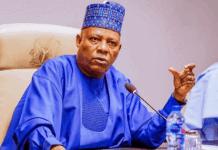Energy transition: Africa has enough market for her hydrocarbon resources, says Nigeria’s Oil Minister
CHIGOZIE AMADI
Nigeria’s Minister of State for Petroleum Resources (Oil), Dr Heineken Lokpobiri, has doused concerns about what happens to Nigeria’s abundant hydrocarbon resources in view of the challenges inherent in the ongoing global energy transition.
Nigeria and other countries in Africa with hydrocarbon deposits have been concerned about what to do with their resources following carbon neutrality (decarbonisation) policies and deadlines set by the western world especially Europe.
However, Dr. Lokpobiri dismissed this concern when he spoke to journalists on the sidelines of the African Energy Week (AEW) just held in Cape Town, South Africa. Lokpobiri stated that Nigeria and other African countries blessed with hydrocarbon deposits will not abandon their resources because of energy transition and net zero-emission deadlines set by the western countries.
According to him, even if the Western countries stop buying hydrocarbon resources produced in Africa, the continent has enough market to take all of her production. He stated that what Africa has been doing is exporting her crude but there would be a departure from that as the continent would produce, refine and consume her products.
Lokpobiri said: “We have enough market in Africa. Africa has enough market for her entire crude production. African market alone is enough to take all that we produce in Africa. All we do now in Africa is we produce crude, we ship it to Europe, India and Singapore, they refine, they ship it back to us. We don’t need that. When we have the refining capacity, we have enough market to take all the products.”
Nigeria has set 2060 as the time it is eyeing to become carbon neutral by ensuring usage of more sustainable and cleaner energy sources with net emission. Although achieving net carbon emission will create huge transformation by providing enormous investment opportunities in areas such as solar energy, hydrogen, and electric vehicles but requires huge capital investment by the government and review of existing energy system governance structures.
At the 21st United Nations (UN) Climate Change Conference of Parties (COP21) in Paris, an international agreement was reached to keep global warming by the end of this century below 2°C compared to pre-industrial levels, preferably lowering it to 1.5°C. At COP26 held in Glasgow, Nigeria pledged to achieve net-zero emissions by 2060.
According to EMRC Group, following the Paris Agreement, Nigeria submitted its first Nationally Determined Contribution (NDC) in 2015 and a revised version in 2021. An NDC is a country’s target to help reduce emissions and adapt to climate change. Each country is required to submit its NDC and update it every five years. The World Economic Forum said Nigeria ranks 108th out of 120 nations on the Energy Transition Index (ETI). The ETI is a tool for the global energy community to monitor the performance of energy systems at the national level. Over the last decade, Nigeria’s overall ETI score has increased by three percent, but system performance scores have decreased by one percent.
In August 2022, the Federal Government released its Energy Transition Plan (ETP) based on the Paris Agreement. The plan aims to address both energy poverty and climate change problems. The ETP outlines the energy transition pathways in major sectors of the country’s economy, which account for 65 percent of total emissions. The ETP is primarily placed on the following key objectives:
To eradicate poverty for over 100 million people through an increase in the standard of living.
To drive sustainable economic growth in key domestic commercial sectors.
To provide universal electricity access to the entire population.
To mobilize investments and private sector participation by creating significant market opportunities in the energy transition process.
Worldometer report says carbon emissions from Nigeria’s power sector were estimated to be 82.6 million metric tons of CO2 equivalent in 2016. According to a 2023 report from Statista, the country’s biggest volume of emissions from power generation occurred in 2014 when over 12.8 million metric tons of CO2 was measured. Nigeria’s ETP intends to make major industries, including transportation, manufacturing, power, cooking, and oil and gas, carbon neutral by 2060.
Breakdown of Nigeria’s sectoral emissions are as follows:
- Power – represents around 27 per cent of in-scope emissions and includes power generation, both on and off-grid
- Oil and Gas – represents about 11 per cent of in-scope emissions
- Industry – represents about 16 per cent of in-scope emissions.
- Transport – represent about 24 per cent% of in-scope emissions.
- Cooking – represents about 22% of in-scope emissions.

























